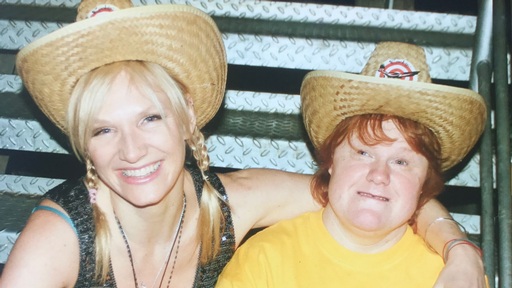Jo Whiley says people with learning disabilities are 'neglected' after her sister is admitted to hospital with Covid
Broadcaster Jo Whiley missed her Radio 2 show last night after her younger sister with learning disabilities and diabetes was admitted to hospital with coronavirus.

Ms Whiley's sister Francis, aged 53, who lives in a care home in Northamptonshire, was admitted to hospital after testing positive for coronavirus last week.
Last night, Ms Whiley took to Twitter and told her followers: "I can’t do my @BBCRadio2 show this evening. My sister Frances is v poorly in hospital with Covid. I don’t feel shiny or happy tonight, I feel very scared."
Later, she told followers of Instagram that x-rays had shown signs of pneumonia and oxygen levels at times been “dangerously low.”
The hospital has managed to sedate her sister to give her oxygen a good boost. “It’s beyond awful not being able to go and give her a hug and hold her hand and help my parents.”
This news comes after charities including Mencap and Peak15 and celebrities including author Ian Rankin have called on the government urging them to prioritise the COVID-19 vaccine for people with disabilities.
Ms Whiley has been campaigning for her younger sister Frances and others like her to be prioritised for the vaccine and believes Frances should have been vaccinated in group four due to her diabetes.
According to the Joint Committee on Vaccination and Immunisation (JCVI) vaccination list, all individuals aged 16 years to 64 years with underlying health conditions which put them at higher risk of serious disease and mortality are group six on the list even though the majority of care home residents are listed in group one.
The NHS initially targeted the top four priority groups, including people over the age of 70 and health and care staff, aiming to offer the jab to everyone in this group by mid-February.
'People with learning difficulties are neglected. They haven't got a voice
Ms Whiley, aged 55, also revealed she was offered the Covid vaccine before her vulnerable sister, and could not understand why that was.
Speaking to BBC Radio 4’s Today Programme, on Tuesday, Ms Whiley said: “Ironically, I got a message to say I was due to have my vaccine before my sister who has got learning difficulties and underlying health conditions. Go figure.
"She is in tier six but she also has quite bad diabetes, which in my understanding puts her in tier four because she has an underlying health condition, so I would have thought that she would have been vaccinated, but that hasn't happened.
"And I suppose what I am doing is just wanting to speak up for people like Frances, people who live in her care home, who have been overlooked, because this happens so often.
"People with learning difficulties are neglected. They haven't got a voice, they haven't got anybody there. Just badgering everybody saying 'What about me? Help me out here'."
Unpaid carers for the elderly and people with disabilities are in priority group six, the same as those with clinical conditions.
Ms Whiley added: "I would give up my vaccine in a heartbeat, if I could, for my sister and any of the residents in her house to have their vaccine. It does not feel right.
"This happens so often, people with learning disabilities are neglected, they haven't got a voice."
'Many are feeling scared and wondering why they have been left out'
According to the Office for National Statistics (ONS), 60 per cent of people who died with COVID-19 in England up to November last year had a disability. For people who had a medically diagnosed learning disability, the risk of death was nearly four times greater for both men and women than for people who did not.
The charity Mencap is calling for everyone with a learning disability to be in at least priority group six for the vaccine.

Chief executive Edel Harris said: “It’s unacceptable that within a group of people hit so hard by the pandemic, even before COVID [this group] on average [die] 20 years younger than the general population, many are left feeling scared and wondering why they have been left out.
“The Joint Committee on Vaccination and Immunisation (JCVI) and government must act now to help save the lives of some of society’s most vulnerable people by urgently prioritising all people with a learning disability for the vaccine.”
Scottish crime author Ian Rankin has a 26-year-old son who has severe learning difficulties and lives in a care home in Edinburgh.
Mr Rankin says his son Kit has been "forgotten" as he did not qualify in the first priority group and concerned he will receive the vaccine before his son.
Mr Rankin said his son "should have been prioritised" for the vaccine.
Speaking to BBC Radio Scotland's Drivetime programme, Mr Rankin said: "Our son has severe learning difficulties, he has suffered epilepsy in the past, he can't look after himself in any way, shape or form, and he's in the same group as us - his parents, who are healthy 60 to 65-year-olds.
"It's a bit late now. My son will get the jab in the next month or so. But we should learn lessons for the future about what it seems to be a bit of a lottery."
"The families and the carers have been kept out the loop.
"The disabled don't have a voice," he added. "They've never had a voice and laterally we're starting to hear their representatives, their family and friends, yelling".
'People with learning disabilities do not always understand social distancing, infection control or PPE'
David Holmes, director and former chair of the Surrey Care Association, and chairman of Peak15, an organisation that provides care services for adults with learning disabilities, said: “The government failure to prioritise vaccination for people with learning disabilities was an extremely ill-thought-out decision.
"What the government has failed to recognise is that people are at risk, not just because of their underlying conditions, but because of the way they live.
"The government also failed to recognise people with severe learning disabilities do not always understand social distancing, infection control or the need for PPE, another aspect that leaves them enormously vulnerable.
“We urge the government to take steps to ensure those with learning difficulties are given the appropriate level of focus in the vaccine rollout. They’re at very high risk and the government needs to recognise that fact and act accordingly.”
Latest News
 29-Jul-24
Dementia Bus gives carehome.co.uk staff insight into life with dementia
29-Jul-24
Dementia Bus gives carehome.co.uk staff insight into life with dementia
 01-Mar-24
Find out the top care homes in 2024
01-Mar-24
Find out the top care homes in 2024
 21-Mar-23
UK's top care homes in 2023 revealed
21-Mar-23
UK's top care homes in 2023 revealed
 03-Jan-23
carehome.co.uk launches free care helpline
03-Jan-23
carehome.co.uk launches free care helpline
 13-Dec-22
5 mins with Emily Whitehurst, chief operating officer for Constantia Healthcare
13-Dec-22
5 mins with Emily Whitehurst, chief operating officer for Constantia Healthcare